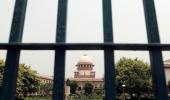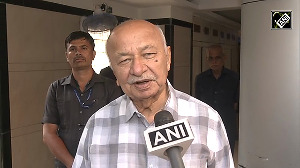The Jharkhand high court has slammed the Central Bureau of Investigation for its "laxity" in probing the murder of Dhanbad judge Uttam Anand, and observed that it seems that the agency was trying to quit the investigation and even protect the accused.

The division bench of Chief Justice Ravi Ranjan and Justice S N Prasad, while reading the report of the narco-analysis test of the two accused, on Friday said that when the auto-driver and his accomplice knew that Anand was a judge before hitting him, how could the CBI come up with the theory of murder for robbing a mobile phone?
Rejecting the CBI's theory, the bench said that the agency has failed to get down to the bottom of the matter.
"The investigation into the case raises a question on the credibility of the CBI. It seems that the agency is now tired of the case and wants to quit the investigation, which is why it is making up stories so that the accused are not charged with murder. The probe is going in such a direction that it appears that the CBI is trying to protect the accused," the bench noted.
The narco-analysis test report was read out in the court. In the report, the autorickshaw driver's assistant Rahul said, "Lakhan was driving the autorickshaw fast. I was sitting on the left side. The judge was jogging slowly. He had a handkerchief in his left hand. Lakhan hit the judge intentionally and he collapsed on the ground."
The report found that someone had assigned them the task to kill the judge.
The bench said that when the report of the narco-analysis test conducted by the CBI says that both the accused knew the judge beforehand and they did not find his mobile phone, how can the investigating agency say that he was murdered for a mobile phone?
With the CBI planning to conduct another narco-analysis test, the bench wondered if there is a need for another such test after four months and if the report contradicted the previous one, which one is to be believed?
The CBI earlier presented a map showing the judge's morning walk route, and stated that the entire area was under CCTV surveillance, and all the mobile phones active in the area at that time were examined but no communication was found between the accused and anyone else.
It said that the accused had not conducted a recce before hitting the judge, and neither had the auto-rickshaw stopped in between nor had anyone contacted them.
But the court said that the way the judge was killed, it seems that the accused had conducted a recce earlier.
The court said that even after the passage of so many months since the incident on July 28 last year, the CBI not being able to close the case with a logical conclusion raises a question on the agency's credibility.
It said that the incident was gradually moving towards a hit-and-run case.
"Jharkhand has been affected by militancy but never before has a judge come under threat. The incident has caught the attention of the entire nation. The court wants that the main conspirator be brought to book and sentenced so that such incidents don't recur," it said.
Additional Solicitor General S V Raju, virtually appearing for CBI from Delhi, said that National Investigating Agency besides CBI is also a very competent agency and the case can be handed over to it, to which the bench wondered whether the CBI was trying to quit the investigation.










 © 2025
© 2025